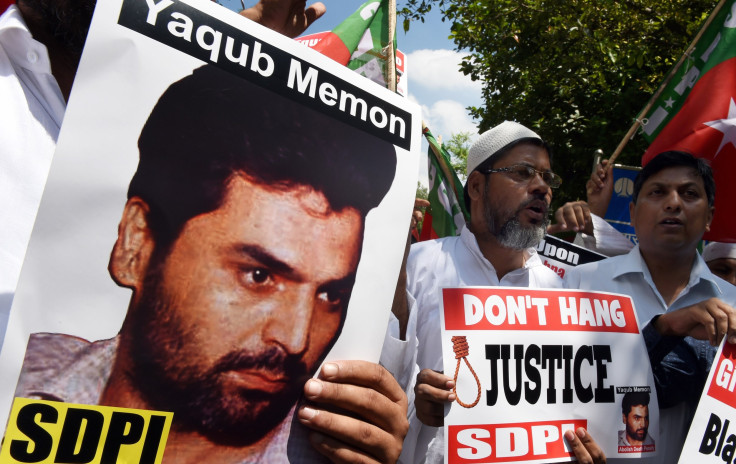1993 Mumbai Blasts Convict Yakub Memon Hanged In India, Security Beefed Up

Yakub Abdul Razak Memon, convicted of financing the 1993 Mumbai bombings that killed 257 people, was hanged early Thursday at a jail in India’s western state of Maharashtra. Memon is the third terror convict to be executed in India in the past four years after Afzal Guru, who was hanged in February 2013 for his role in the 2001 attack on Indian parliament, and Mohammed Ajmal Kasab, the sole surviving gunman of the 2008 Mumbai attack, who was executed in November 2012.
The 1993 blasts, a series of 13 bomb explosions at prime areas in India's financial capital of Mumbai, were the deadliest terror attack in the country. Memon was found guilty on July 27, 2007, of helping raise funds for the bombings.
He was hanged in Central Jail in Nagpur, Maharashtra, on his 53rd birthday, according to local media. His body will be flown to his hometown in Mumbai for cremation after an autopsy, and is expected to reach the city by Thursday afternoon.
Indian President Pranab Mukherjee had reportedly rejected Memon’s mercy plea late Wednesday, following which his lawyers moved the Supreme Court to request that Memon's execution be postponed by 14 days. However, the court rejected the request, clearing the way for Memon’s hanging.
Amid news of the execution, security in the country has been stepped up, especially in sensitive areas of Mumbai. Police have also tightened security outside Memon’s residence in Mahim area and arrested people with crime record as a preventive measure, IBN Live reported. The cyber cell is also reportedly keeping a watch for any provocative messages on the Internet.
Chartered accountant by profession, Memon had maintained that he surrendered to police in India's neighboring country of Nepal on July 28, 1994. However, the Indian Central Bureau of Investigation said that he was arrested in New Delhi on Aug. 5, 1994.
Memon's death sentence was decried by Indian politicians. "You have to differentiate between this person, who has surrendered before the court and the other people who are in Pakistan," Communist Party of India (Marxist) politburo member Brinda Karat told Indo-Asian News Service Wednesday.
"The senior officer in-charge of the operation himself wrote that death sentence was not correct," Karat said, referring to the late B. Raman, a former Research and Analysis Wing official, who favored clemency for Memon for cooperating with and helping the officials in their investigation.
Memon’s elder brother Ibrahim Memon alias "Tiger” and Dawood Ibrahim, who were top gangsters in Mumbai in the 1990s, are the main suspects of the bombings, which targeted the city’s important places, including the Bombay Stock Exchange, Mumbai airport, Air India offices and three upscale hotels. Both Ibrahim and Dawood have fled the country.
The court trial for the case began on June 6, 1995, and ended in January 2003 -- one of the longest trials in the country. Ten of the 100 convicts were sentenced to death by the Terrorist and Disruptive Activities (Prevention) Act court in 2006, but their sentences were later commuted to life imprisonment. Several people, including Bollywood movie star Sanjay Dutt, have been accused of plotting or helping the conspirators.
The 1993 Mumbai bomb blasts are considered an act of vengeance for the December 1992 demolition of Babri Masjid, a 16th century mosque in the northern state of Uttar Pradesh, by Hindu nationalists. The demolition also caused communal riots in the country that killed at least 2,000 people.
© Copyright IBTimes 2024. All rights reserved.






















